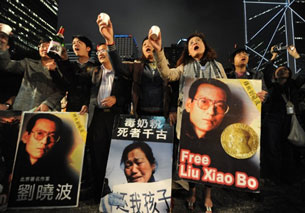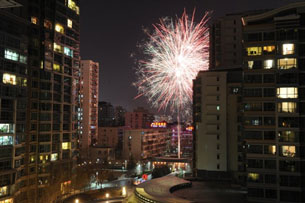RFA:Activists Slam Nobel Crackdown
22 7月
2010-12-13
Chinese rights activists speak out about the restrictions they endured during the Nobel award ceremony.
 AFP
AFP
Protesters toast Nobel prize winner Liu Xiaobao in Hong Kong, Dec. 10, 2009.
Life for China’s political rights activists began gradually to return to normal on Monday after authorities detained some of them, held others under house arrest, and forced others to stay in out-of-town locations ahead of the ceremony awarding the 2010 Nobel peace prize to jailed dissident Liu Xiaobo.
“[We came back on Sunday] evening,” said Beijing-based journalist Gao Yu, who was held in a mountain resort location with her entire family during the lavish award ceremony in Oslo, in which Liu was represented by an empty chair.
“The police have started to pack up and leave after watching me for two months,” said Gao, who has been under police surveillance since the Nobel committee announced Liu’s award.
“It’s a coordinated movement,” she said. “The whole thing was linked to the Nobel prize.”
Beijing has tightened the screws on Chinese political activists after Liu was named the Nobel Peace Prize recipient on Oct. 8.
Liu’s wife, Liu Xia, has been held under a form of undeclared house arrest, while large numbers of lawyers, rights activists, and writers were prevented from leaving China ahead of the event.
Statement under duress
Beijing-based rights activist Liu Shasha, also known as Liu Linna, said she had been released after being beaten into signing a guarantee of good behavior.
“The interview record taken by the Beijing municipal police on Dec. 8 with Liu Linna happened after they had beat me up and forced a confession out of me,” Liu said in a statement after her release.
“I never signed the statement, and it did not represent my true views and opinions, and so it is invalid from a legal point of view,” she said.
Beijing Film Academy professor Cui Weiping said she had also been allowed to return home after taking a trip out of town under police escort.
“I think this strict surveillance was a highly irrational act, including not letting [Liu Xiaobo’s] wife leave the country,” Cui said.
“They have made everyone pay the price for it,” she said. “They have made us pay the price for it.”
There is still no sign of Beijing-based activists Wang Lihong or Hua Ze, whose whereabouts have been unknown for more than a month, activists said.
Calls to the cell phones of Beijing-based activists Zhang Zuhua, Xu Zhiyong, and Teng Biao, along with retired Shandong University professor Sun Wenguang, Wuhan-based Qin Yongmin, and participants in the Guizhou human rights conference were all answered by a recorded announcement of temporary disconnection of service on Sunday.
The tight restrictions meant that only a handful of Chinese activists were able to attend the ceremony in Oslo’s city hall, at which the Nobel prize medal and diploma were presented to an empty chair.
Fang Zheng, a disabled veteran of the 1989 military crackdown on the Tiananmen Square protests, attended the ceremony in Oslo from his home in the United States, however.
“We all hope that in future, China will one day take a democratic route,” said Fang.
Beijing enraged
Liu Xiaobo, 54, was sentenced in December 2009 to an 11-year prison term for “incitement to subvert state power” after he co-authored Charter 08, a controversial document calling for sweeping political change in China.
Dozens of others said they had been forced on out-of-town trips, held prisoner in their homes, or otherwise harassed by the authorities as the result of the announcement of Liu’s Nobel award, which enraged Beijing.
Beijing’s official People’s Daily on Sunday said the award ceremony was “an embarrassment,” and the work of a small number of people in Western countries with “ulterior motives.”
However, the cutting-edge Guangzhou-based newspaper Southern Metropolis News carried a photograph that was apparently unrelated to the Nobel event, but which prominently featured three empty chairs.
And in Hong Kong, which enjoys greater freedoms than other Chinese cities, artists and political activists staged a performance art and theatrical event in the territory on Sunday, calling for Liu’s release.
“We all hope that we can use peaceful and nonviolent means to achieve a democratic transformation, so the award of the prize to Liu Xiaobo is very meaningful for us,” said Hong Kong rights activist Zou Xingtong.
“What they have done is wrong,” Zou said. “At the very least, you can’t convict a person on the basis of what they say.”
“Everyone here is all agreed on that, and we are calling for his release,” he said.
An ‘easy’ choice
Hong Kong’s Chinese language Ming Pao newspaper quoted legislative councillor and pro-democracy activist Albert Ho as saying that Nobel committee chairman Thorbjorn Jagland had said the choice of Liu for the 2010 peace prize was an easy one for the committee.
“The Chinese government’s decision to sentence Liu Xiaobo to a heavy sentence of 11 years in prison gave us nothing more to think about,” Ho’s notebook quoted Jagland as saying.
“And Beijing’s bullying and tyrannical response, its inversion of right and wrong, have left us in no doubt that we made the right decision,” Jagland is reported to have told Ho.
Beijing has slammed the award as disrespectful to its legal system, and official media on Friday said China was being put on trial for not subscribing to Western values.
Three U.N. human rights investigators called on Monday for the release of Liu, and for a halt to actions against his wife and other supporters.
“This recent and alarming trend to increasingly restrict the space to exercise the rights to freedom of expression and the ability of Chinese human rights defenders to carry out their peaceful and legitimate activities calls into question China’s commitments to promote and protect universal human rights,” Margaret Sekaggya of Uganda, Frank La Rue of Guatemala, and El Hadji Malick Sow of Senegal said in a statement.
The investigators report to the U.N.’s 47-nation Human Rights Council where a developing-country majority generally blocks any criticism of China.
Reported by Xin Yu, Qiao Long, and Shen Hua for RFA’s Mandarin service, and by Hai Nan for the Cantonese service. Translated and written in English by Luisetta Mudie.
http://www.rfa.org./english/news/china/crackdown-12132010145304.html?searchterm=none

近期评论